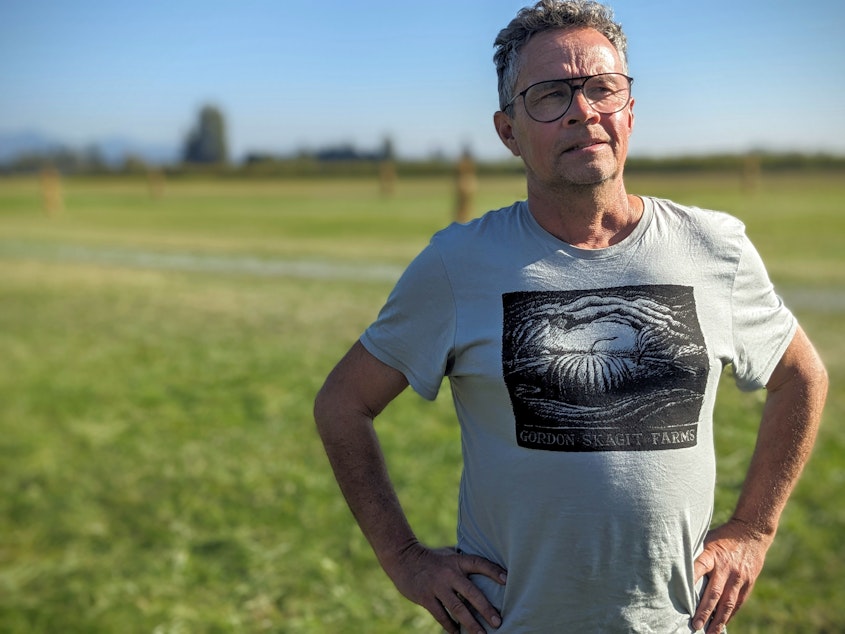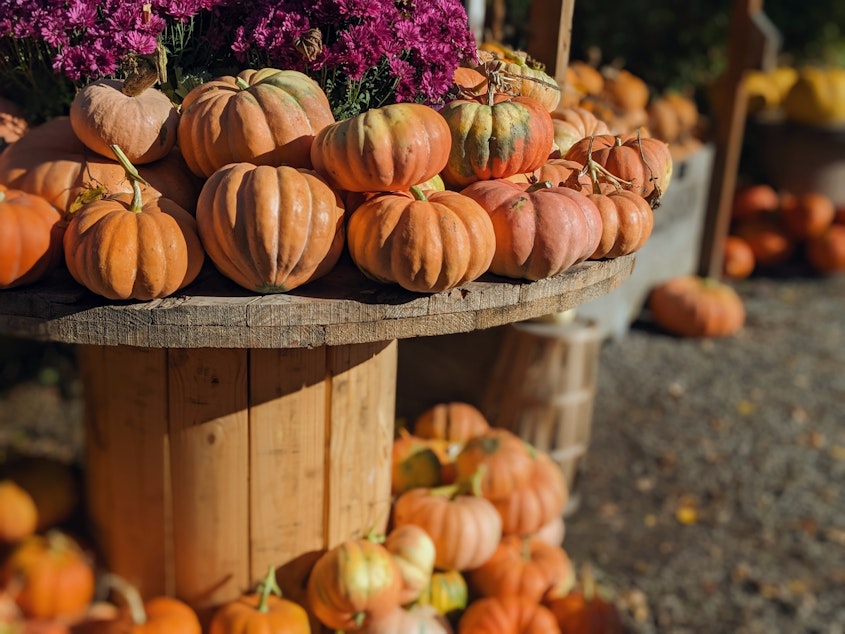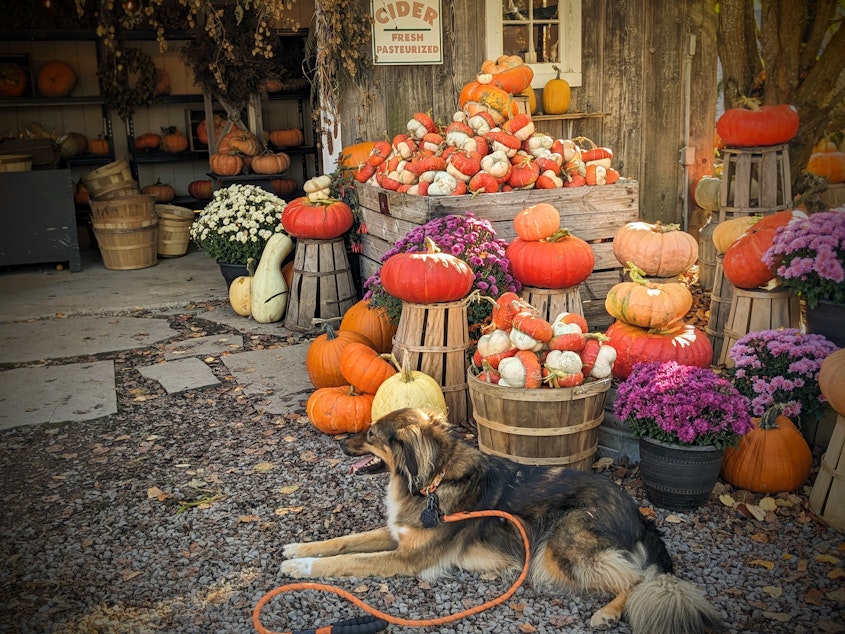As fall festivities draw crowds to Skagit Valley farms, rules to limit agritourism sow division

Eddie Gordon is really passionate about pumpkins.
As he wanders through a farmstand so idyllic it caught Martha Stewart’s eye, he points out the different varieties he grows.
“Maxima, Pepo, Moschata … I love all these heirloom looking pumpkins and pastel shades kind of reaching out,” he says, pointing to a bin full of dusty pink and popcorn yellow gourds. “Man, I just love it.”
He stops at a squat, reddish variety that looks a bit like Cinderella’s carriage before it’s transformed. These are Rouge d’Etampes, the French Red Pumpkins. When pressed, Gordon picks this one as his favorite.
“They're beautiful,” he says. “They're just passionate. The French would come up with something red, wouldn't they?”
Sponsored

Gordon Skagit Farms is emblematic of what so many people love about the Skagit Valley, a farming community about an hour north of Seattle. It’s a small, diverse, family-owned farm that mostly grows pumpkins but also has a sunflower field and apple orchards. The farm has been in Gordon’s family since the 1930s, resisting the pressures of development and large-scale commercial agriculture. And this time of year, it draws visitors from around the world in search of heirloom pumpkins.
Protecting operations like Gordon’s is the goal of new agritourism rules up for debate in Skagit County. The proposed regulations would allow for farmstands like Gordon’s, but crack down on other types of agritourism, like weddings, tasting rooms, and restaurants. Proponents of the plan say it’s vital to protect farmland in the Skagit Valley, but critics say it hobbles small farmers who need alternative income sources to stay afloat.

“The biggest thing that we wanted to do with the proposed changes was encouraging those farming operations and the soil-dependent production of products,” said Michael Hughes, chair of the Skagit County Agricultural Advisory Board. “We look at Kent Valley or all those other ones down around Seattle, those were all farms 50 years ago as well.”
Sponsored
As Seattle boomed, urban sprawl spread into those farming communities. In other regions, like Woodinville, community members have been divided for years over how farmland, tasting rooms, and restaurants should co-exist.
Hughes and his colleagues don’t want that to happen to the Skagit Valley. A fourth-generation farmer himself, he’s passionate about preserving the community for agricultural use. As chair of the agricultural board, he helped shape the proposed updates to the Skagit County code.
“With the pressures we have around us, if you start allowing nonagricultural activities, it gets very easy to [say], ‘Oh, what's one more? What's one more?’ We feel that we need to be very disciplined in how we use the code and keep activities on the farm ground,” Hughes said.
The proposed regulations would enforce rules that require residents to get a “special use permit” for any event that’s not directly tied to selling products grown on the land. That includes weddings, parties, restaurants, and tasting rooms, unless they are very small. The rules would reduce the number of permits available to a farm from 24 to 12 per year. They would also put other constraints on the size and scale of agritourism activities that aren’t directly tied to farming, like a farmstand.
To Amber Watts, those rules could mean the end of a dream, one that she chased from Austin, Texas, to the Skagit Valley. Watts and her partner moved to the region because they felt it was the perfect place to start their business, Garden Path Fermentation. They make beer, wine, cider, and mead – all using wild yeast that naturally occurs here.
Sponsored
“Our vision was to have a small farm where we grew a lot of our own ingredients, including cider, apples, and wine grapes,” she said. “And we could also have a tasting room with a seat-to-glass experience where people could come and have a glass of cider under the tree that the apples came from.”
But Watts says the county rejected the idea.
“I think what was heard was we want to build an Applebee's in an apple orchard,” she said.
Watts hoped the new agritourism rules would create a path forward for her business, but they don’t allow for the type of operation she had in mind. For now, Garden Path Fermentation sources ingredients from other farms and operates out of a facility in Burlington.
Watts and other businesses fighting the proposed regulations say the rules would favor large farming operations.
Sponsored
“Unless you’re big, big agriculture, commodity farming isn't sustainable,” Watts said. “It can't pay for the upkeep you need on your property. It can't pay for a new fence or roof or a tractor. If you have 40 acres and you're raising a family on that property, they need to be able to diversify their income so they can actually exist in this county. We pride ourselves on being a community of small farms, but this proposal is completely overlooking small farmers.”
Both sides of the debate say they want the same thing, to protect the rare jewel that is the Skagit Valley. With its small, diverse, family-owned farms, the region is bucking a national trend. Most American farmland has become large, monocropped, and industrial.
The community is afraid "Big Ag" will eventually swallow the Skagit Valley up, or urban sprawl from Seattle to the south and Vancouver to the north will erase the farming community. The question is, will agritourism hold off those forces, or invite them in?
The community may get an answer to that question soon. The Skagit County Planning Commission is expected to take up deliberations on the proposal in December.
In the meantime, Eddie Gordon is going to keep selling his pumpkins and hoping for the best.
Sponsored
“Something’s going to have to be figured out with these various groups where there can be some sort of common ground,” he said.
“It's like projecting into the future,” he added. “What are the worst-case scenarios, and would that come to fruition? I think they're thinking about that and trying to project a way of life.”




